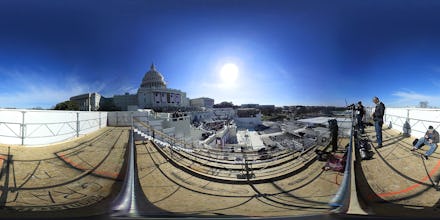What's the cost of Donald Trump's inauguration — and who is paying the bill?

As the inauguration of Donald Trump as the 45th president of the United States proceeds on Friday, it bears remembering that a presidential swearing-in doesn't just happen. It takes time and money.
According to the New York Times, the total cost of Trump's inauguration could exceed $200 million when all is said and done. That ballpark figure is based on the price tag of past inaugurations, in addition to unknown factors, like how many people attend and what the weather is like.
When it comes to who's footing the bill, there are actually two parts to the inauguration — and two sources of funding.
The actual swearing-in, traditionally held on the west front of the U.S. Capitol Building, is paid for by appropriations from Congress.
For Friday's ceremony, Congress approved a request for $1.25 million from the Joint Congressional Committee on Inaugural Ceremonies. This amount is similar to costs in prior years, according to the appropriations summary.
The money provides funding for stuff like the inaugural stands and support facilities — and includes associated overtime and security costs within the Capitol Police budget.
Some of those inaugural stands have been visible in broadcasts of the ongoing events.
So far, they look somewhat emptier than the bleachers during President Barack Obama's inaugural motorcade in 2009.
But the stands are, of course, not the main reason for the huge inaugural budget.
It's everything else that really makes the overall price tag soar: Event security, which will include 28,000 people from three dozen state, local and federal agencies, is by far the biggest ticket item.
According to the Times, security costs for Trump's inauguration could reach $100 million — and the federal government is responsible for the bill.
Many of Inauguration Day's surrounding festivities — the balls and concerts, parades and parties — are paid for by private donations. The Presidential Inaugural Committee (fundraisers and friends of the President-elect and his team) plans these events.
Breaking down the costs
President Barack Obama's inauguration in 2009 cost $170 million. The swearing-in ceremony itself cost $1.24 million, paid for by congressional appropriations.
The federal government estimated it spent about $49 million during that inaugural weekend, according to ABC. Washington, D.C., Virginia and Maryland requested an additional $75 million from the federal government to help pay their share of police, fire and medical services.
Together with the inaugural committee's budget of $45 million — consisting of private donations to pay for the parties — the total came to $170 million.
George W. Bush's 2001 inauguration ceremony cost $1 million, according to Gleaves Whitney, director of the Hauenstein Center for Presidential Studies at Grand Valley State University. That portion was was covered by Congress. Private funding of $40 million — received via donations and ticket sales — paid for the galas, balls and concerts.
In reviewing the role of private funding in previous presidential inaugurations, Whitney found that the costs associated with Inauguration Day are rising — with the exception of a comparatively lean party budget for Bill Clinton's second term:
George W. Bush's 2nd inaugural in 2005: $40 million
Based on Whitney's research, it seems the biggest jumps in private-sector inauguration funding have been associated with Republican presidents.
According to Whitney, Carter's inaugural festivities were intentionally downplayed in the wake of Watergate. This may make Reagan's costs seem especially high, but inflation and the addition of several balls helped drive up the 1981 price tag.
Over time, congressional appropriations for presidential inaugurations have remained consistent; the amount required for security purposes seems to be growing from the need to handle larger crowds — or at least the possibility of larger crowds.
It's funding for parties and other celebrations that's at the will of the personalities — and the changing times.
Sign up for The Payoff — your weekly crash course on how to live your best financial life.